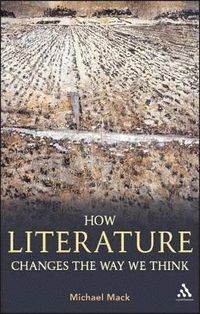
endast ny
How Literature Changes the Way We Think
This book argues for the importance, and societal impact, of the study of the arts and humanities, and of literature in particular. The capacity of the arts and the humanities, and of literature in particular, to have a meaningful societal impact has been increasingly undervalued in recent history. Both humanists and scientists have tended to think of the arts as a means to represent the world via imagination. Mack maintains that the arts do not merely describe our world but that they also have the unique and under appreciated power to make us aware of how we can change accustomed forms of perception and action. Mack explores the works of prominent writers and thinkers, including Nietzsche, Foucault, Benjamin, Wilde, Roth, and Zizek, among others, to illustrate how literature interacts with both people and political as well as scientific issues of the real world. By virtue of its distance from the real world - its virtuality - the aesthetic has the capability to help us explore different and so far unthinkable forms of action and thereby to resist the repetition and perpetuation of harmful practices such as stereotyping, stigma, exclusion, and the exertion of violence.
Utgiven: 2011
ISBN: 9781441103208
Förlag: Continuum Publishing Corporation
Format: Inbunden
Språk: Engelska
Sidor: 208 st
This book argues for the importance, and societal impact, of the study of the arts and humanities, and of literature in particular. The capacity of the arts and the humanities, and of literature in particular, to have a meaningful societal impact has been increasingly undervalued in recent history. Both humanists and scientists have tended to think of the arts as a means to represent the world via imagination. Mack maintains that the arts do not merely describe our world but that they also have the unique and under appreciated power to make us aware of how we can change accustomed forms of perception and action. Mack explores the works of prominent writers and thinkers, including Nietzsche, Foucault, Benjamin, Wilde, Roth, and Zizek, among others, to illustrate how literature interacts with both people and political as well as scientific issues of the real world. By virtue of its distance from the real world - its virtuality - the aesthetic has the capability to help us explore different and so far unthinkable forms of action and thereby to resist the repetition and perpetuation of harmful practices such as stereotyping, stigma, exclusion, and the exertion of violence.
Ny bok
2369 kr2493 kr
5% studentrabatt med Studentapan
Begagnad bok (0 st)
Varje vecka tillkommer tusentals nya säljare. Bevaka boken så får du meddelande när den finns tillgänglig igen.



